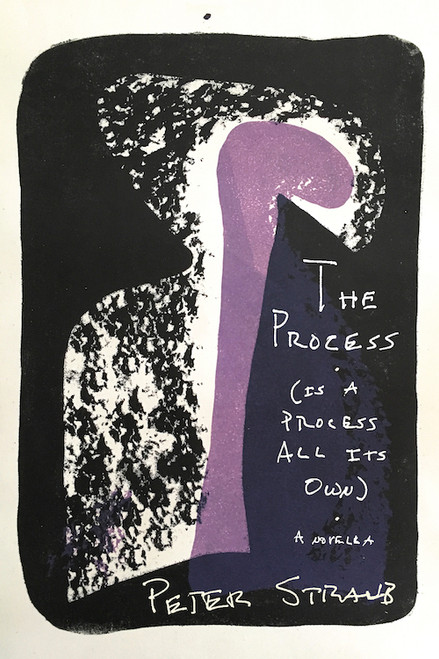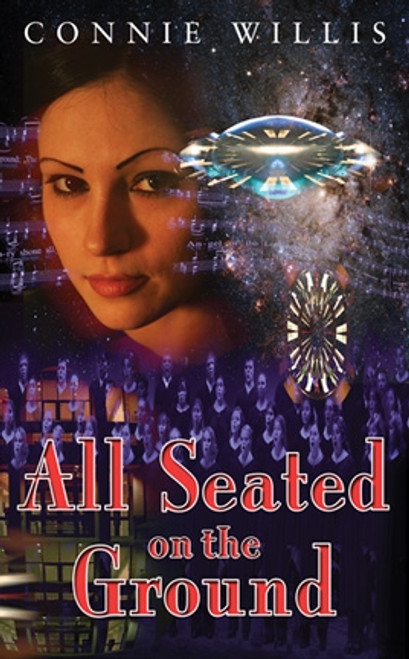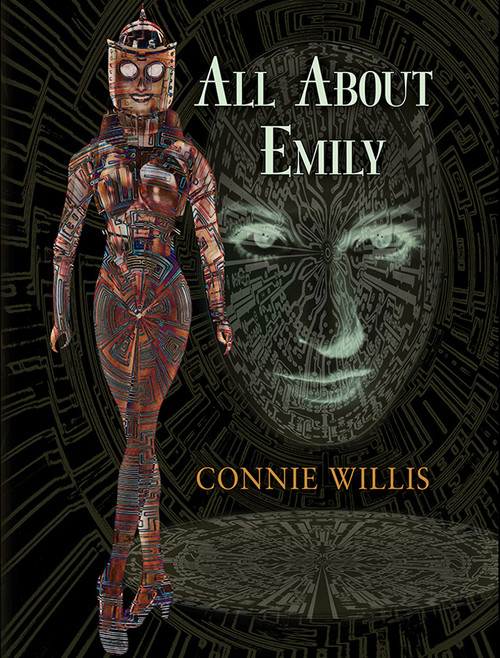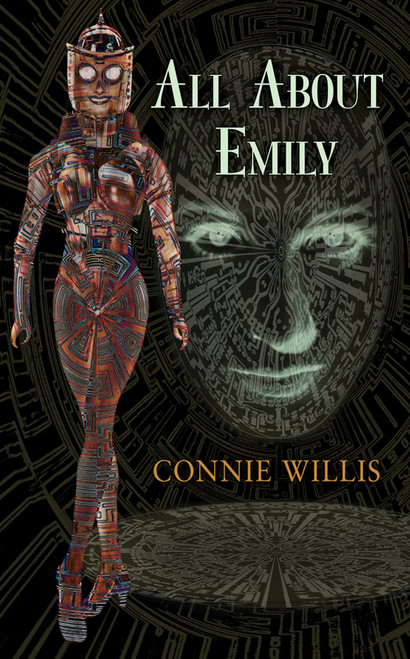Dust jacket by Michael Fusco Straub.
In The Process (is a Process All its Own), Peter Straub brings back Tillman Hayward, a latter day Jack the Ripper familiar to readers of The Skylark and A Special Place. Tilly, known for good reasons as The Ladykiller, stands at the dark heart of this astonishing novella.
Tilly is a classic serial killer, and we watch him go about his “work” in the American Midwest of the 1950s. His story is one of madness and bloodlust artfully concealed beneath a thin, civilized veneer. In keeping with his nickname, he leaves a trail of mutilated female corpses behind him wherever he goes.
Straub tells Tilly’s story in a clear, unflinching voice that is at once enthralling and disturbing. At the same time, Straub sets that story against the larger story of a world filled with enigmatic occurrences and impossible encounters. It is a world in which the dead reappear, in which language carries its own peculiar properties, and “a hateful and discordant music” surrounds everything. It is a world which only Peter Straub could have evoked with such clarity and power.
Moving from the American Heartland to the stately homes of England, and from the arid worldview of Tilly to the fevered sensibility of Henry James, this nexus of connected stories is one of the strangest, most unsettling creations of a long, distinguished career. The Process (is a Process All its Own) is the clear product of a modern master. Expect it to haunt you for a very long time to come.
Limited: 750 signed numbered hardcover copies
(Excerpt)
A man named Tillman Hayward wrote these words in a Hardy & Badgett leather-bound notebook, 5” x 4”, with pale blue lined paper. He had purchased the notebook, along with three others like it, on-sale for $9.95 at Struck & Chambers, a high-end stationery store in Columbus, Ohio. He “lived” in Columbus. His real life took place elsewhere.
Tillman Hayward, “Tilly,” did not work in Columbus. He earned his reasonably substantial salary as a property manager in Columbus, but his real work—his “work”—was done elsewhere. This separation was self-protective.
Tilly was writing with a German-made mechanical pencil purchased for $8.99 at the same store. Faber Castell, its manufacturer, described it as a “propelling pencil.” He liked the word “propelling:” to propel sounded madly up-to-date. A propeller-pencil. (It, the word not the pencil, smelled a great deal of Elmer’s Glue.)
Tilly Hayward had been married for nine years to a blonde woman named Charlotte, nee Sullivan. Tilly and Charlotte had produced three blonde daughters, each of them the replica of both her mother and their sisters. They looked like triplicates born in different years. These perfect girls were named Edith, Hannah, and Faith. The Hayward family lived in one of the apartment buildings owned by Charlotte’s father, Daniel Sullivan, a flinty Irish immigrant in a flat cap, who had never known a moment’s warmth or sentimentality. Tilly’s job was to oversee the properties, keep them in satisfactory condition, check out whatever new might come on the market, and to make sure the rents came in. He deployed a full range of subcontractors to deal with the tenants’ demands. With his father-in-law’s approval, Tilly also had taken it upon himself to search for other properties to add to his holdings. He had convinced his father-in-law that the city of Milwaukee, his birthplace, was an excellent location for the long-considered expansion of the Sullivan company. Six or seven times a year, sometimes way more than that, Tilly either drove, took the train, or flew to Milwaukee (General Mitchell Field, where his tricky old Dad used to take the kids to watch the planes take off and land). There, he sometimes stayed with his brother, Bobby, and Bobby’s wife Mags, in the old brown-and-yellow duplex on West 44th Street, where Bobby, Tilly and their sister Margo, then Margaret, had been born and raised. At other times, he planted himself in hotels, not always under his real name. “Jesse Unruh” and “Joe Ball” spent a few days at the Pfister, “Leslie Ervin” at the funkier, less expensive Plaza. Although Tilly appeared to be, and sometimes actually was, dedicated in his search for commercial properties, he had as yet to purchase a single building for the Sullivan real estate empire.
It was in Milwaukee and under conditions of rigorous secrecy that Tilly’s real “work” was carried out.
Tilly Hayward was one of those men in possession of two lives. Either he was a dark, disturbing criminal sociopath who wore a more conventional person around him like a perfectly fitted suit of clothing, or he was a conventional person who within himself concealed a being like a wild animal. Tillman’s response to his duality was not simple. He wondered sometimes if he were really a person at all. Perhaps he had originated on some far away star—or in some other, far distant time. Often, he felt other.
Many of the words whose odors Tillman caught as they emerged reeked of death and corruption. There were some words that almost always stank of the graveyard, of death and corpses. (These were words such as happiness, fulfillment, satisfaction, pleasure, also joy.) Tillman understood that these words smelled foul because the things they referred to were false.
In Tilly’s sensitive nostrils, the word “job” often smelled like vomitus. People who spoke of their jobs evoked entire butcher shops filled with rotting meat. Tilly knew that if he ever permitted himself to speak in mixed company, away from his family, of the job he did for Sullivan Real Estate Holdings, the same stench would attach itself to his vocabulary. Therefore, he never did speak of these matters except to his wife, who either did not notice the stinks that accompanied these words or, having grown accustomed to them during childhood, pretended that she did not. Words like sorrow, unhappiness, grief, these words which should have carried perhaps the worst stenches of all, did not actually smell so bad—more like rotting flowers than rotting meat, as though what had once been fresh about them was not so very distant. When Tilly went out in search of the people that he dealt with as part of his real “work,” he deliberately sought women who uttered the foulest words of all. He had an unerring instinct for women whose vocabulary betrayed a deep intrinsic falsity. He often thought that other people could do the same. He thought that politeness kept other people from speaking of this power, so out of uncharacteristic tact he himself remained silent about it. There were times when he wondered if he alone could detect the odors that clung to the spoken words, but if that were true, and the power only his, he could never figure out what to do with it. Apart from being perhaps another indication of his status as an alien from a sphere far different, the power seemed a mere frivolity: like so much else, it had no relevance beyond its own borders.
Funny thing: the word “remorse” actually smelled pretty good, on the whole. The word remorse tended to smell like wood shavings and sunburnt lawns, at its worst it smelled of ant hills, or something sort of like ant hills, sand dunes, Indian burial mounds. He never objected to the smell of the word remorse. In fact, rather to his surprise, Tilly tended to like it a lot. It was a pity that the word was heard so seldom in the course of ordinary conversation.
Tilly, of course, tended not to have ordinary conversations.
- artists_list:
- Michael Fusco
- authors_list:
- Peter Straub
- binding:
- Hardcover
- book_case:
- None
- book_edition:
- Deluxe Limited
- book_length:
- 96 pages
- book_type:
- Novella
- country_of_manufacturer:
- United States
- isbn:
- 978-1-59606-835-3
- is_subpress:
- Yes
- manufacturer:
- Subterranean Press
- print_status:
- Out of Print
- year:
- 2017







